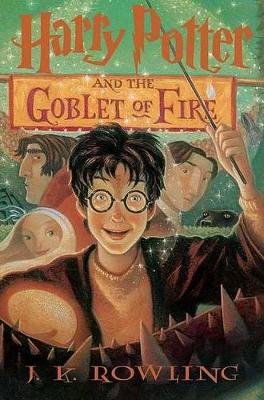Reviewed by clementine on
Reading the books so rapidly like I'm doing right now (which I've never done before - last time I reread them it spanned a year!) makes the growth in Jo's writing all the more obvious. It's hard to believe that this is the same woman who wrote the books I read only a week or so ago. Not that they weren't excellent books (as I think I've been over a million times), but the complexity of GoF really makes them pale in comparison. This is where her ability to plant clues that you would never, ever notice if you weren't specifically looking for them really begins to shine.
For example, right at the beginning, Voldemort says to Wormtail: "I will allow you to perform an essential task for me, one that many of my followers would give their right hands to perform..." Of course, this is a common expression, but masked in it lies the absolute truth: on page 15 of this 636-page text, we are told explicitly what is to happen somewhere around page 500. (I also love some of the other common figurative expressions that contain truths - Bagman saying that Crouch speaks about 150 languages and Percy hotly saying that it's actually at least two hundred; someone (Bagman again, maybe?) remarking on how the goblins speak Gobbledegook, which is literally their language.)
There are so many little hints like this that I didn't make note of, but another example comes when Harry is trying to solve the riddle, specifically the lines "First think of the person who lives in disguise / Who deals in secrets and tells naught but lies." The answer to this is "spy" - but the first word Harry thinks of is "impostor". Of course, this is foreshadowing Barty Crouch, Jr.'s appearance, and the lines of the riddle do, in fact, completely apply to him.
Masterfully plotted, as always, with little hints as to conflicted, fully realized characters. As is common in these books, many of the hints we get about characters don't become important enough to even register until we have information contained in later books, but it is a testament to Rowling's genius and meticulous plotting that they are, in fact present. She never, ever waits to introduce something until it becomes important, and I'm not just talking about characters or character traits here. An excellent example of this within GoF is the Veritaserum, which becomes crucial to the ending as it's the vehicle which allows pages of expository dialogue from Crouch. This is introduced much, much earlier on, when Snape threatens to feed Harry three drops of it (and, indeed, Crouch is given three drops when it comes time for him to confess to his crimes). This is introduced as merely another way of showing the hostile dynamic between Harry and Snape, and not as an important plot point, showing once again how well Jo masks important clues and details.
I'm rambling here. I'm not talking about this book on general terms, but giving specific examples. However, these examples highlight exactly the sorts of things I love about the series, and that blow me away, and that leave me truly in awe of all that JK Rowling is capable of. GoF is without a doubt one of the best books of the series, and essentially perfect.
Reading updates
- Started reading
- 9 September, 2012: Finished reading
- 9 September, 2012: Reviewed
- Started reading
- Finished reading
- 9 September, 2012: Reviewed
- Started reading
- Finished reading
- 9 September, 2012: Reviewed
- Started reading
- Finished reading
- 9 September, 2012: Reviewed
- Started reading
- Finished reading
- 9 September, 2012: Reviewed
